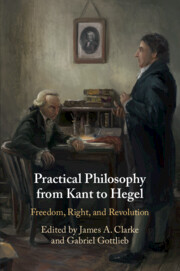Book contents
- Practical Philosophy from Kant to Hegel
- Practical Philosophy from Kant to Hegel
- Copyright page
- Contents
- Contributors
- Acknowledgments
- Abbreviations
- Introduction
- 1 The Original Empty Formalism Objection
- 2 Freedom and Ethical Necessity
- 3 Maimonides and Kant in the Ethical Thought of Salomon Maimon
- 4 Erhard on Right and Morality
- 5 Erhard on Revolutionary Action
- 6 Elise Reimarus on Freedom and Rebellion
- 7 Freedom and Duty
- 8 Fichte’s Ethical Holism
- 9 Jacobi on Revolution and Practical Nihilism
- 10 The Political Implications of Friedrich Schlegel’s Poetic, Republican Discourse
- 11 The Limits of State Action
- 12 Echoes of Revolution
- 13 Public Opinion and Ideology in Hegel’s Philosophy of Right
- Bibliography
- Index
4 - Erhard on Right and Morality
Published online by Cambridge University Press: 16 March 2021
- Practical Philosophy from Kant to Hegel
- Practical Philosophy from Kant to Hegel
- Copyright page
- Contents
- Contributors
- Acknowledgments
- Abbreviations
- Introduction
- 1 The Original Empty Formalism Objection
- 2 Freedom and Ethical Necessity
- 3 Maimonides and Kant in the Ethical Thought of Salomon Maimon
- 4 Erhard on Right and Morality
- 5 Erhard on Revolutionary Action
- 6 Elise Reimarus on Freedom and Rebellion
- 7 Freedom and Duty
- 8 Fichte’s Ethical Holism
- 9 Jacobi on Revolution and Practical Nihilism
- 10 The Political Implications of Friedrich Schlegel’s Poetic, Republican Discourse
- 11 The Limits of State Action
- 12 Echoes of Revolution
- 13 Public Opinion and Ideology in Hegel’s Philosophy of Right
- Bibliography
- Index
Summary
In his Foundations of Natural Right, J. G. Fichte advances the innovative thesis that the theory of right is independent of, or separate from, moral theory. Although Fichte is concerned to stress the originality of his approach, he refers approvingly to some “excellent hints” in the writings of J. B. Erhard. Given the recent scholarly interest in Fichte’s account of the relationship between right and morality, it is surprising that Erhard’s position is seldom discussed. Where it is discussed, it is often presented as merely a hesitant precursor of Fichte’s position. This paper provides a corrective to that view by arguing that Erhard’s account of the relationship between right and morality constitutes a distinctive and philosophically compelling position. In the first two sections, I reconstruct Erhard’s account of the relationship between right and morality. I argue that Erhard’s position is best characterized as focusing on the dynamic interplay between the theory of right and the requirements of morality as articulated by Kantian moral theory. In the third section, I demonstrate the coherence and significance of Erhard’s position by considering it in relation to a central debate in the philosophy of law—the debate between legal positivism and natural law theory.
- Type
- Chapter
- Information
- Practical Philosophy from Kant to HegelFreedom, Right, and Revolution, pp. 61 - 79Publisher: Cambridge University PressPrint publication year: 2021



